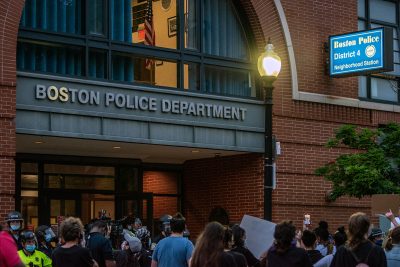As part of his declaration Friday of racism as a public health crisis, Mayor Marty Walsh is reevaluating the Boston Police Department’s $3.61 billion budget.

Walsh proposed reallocating 20 percent of the BPD’s $61 million overtime budget to community services.
“In Boston, we embrace the opportunity this moment and this movement offers us,” Walsh said during a press conference. “With these actions, we will increase equity in public safety and public health, and launch a conversation that can produce lasting, systemic change.”
The $10 million budget cut would be divided into six strategies to combat racism in Boston. In addition to a $3 million increase in funding to the Public Health Commission, the new budget will support housing security initiatives, mental health programs and violence prevention, as well as food security and economic support to minority businesses.
Councilor Kenzie Bok of District 8 said Walsh’s plan is a good first step, but effectively reallocating funds is easier said than done.
“Each one of those investments has the potential to be a transformative thing if we spend the money wisely,” Bok said. “I think that $12 million has the potential to be a really significant down payment towards envisioning a more just city. Is it enough? Absolutely not. ”
Systemic change is a complex fight, Bok said. It will take conscientious effort to truly fix the root of the problem, she said, and not just provide Band-Aid solutions.
“It is true that systemic change is complicated, and saying so is not an effort to push off or try to block that change,” Bok said. “It’s just an effort to get real about what it’s going to take to get it done.”
Bok said the Black Lives Matter movement is an opportunity for change, but it has to extend further than a moment of awareness to make legitimate differences.
“I think what we’re all trying to wrap our heads around is: how do you take the acute awareness in this moment of how broken our society is and how much things need to change,” Bok said, “and how do you convert that into the kind of sustained energy that can drive some of these systemic changes?”
Brock Satter, an organizer of Mass Action Against Police Brutality, said holding police officers accountable for their actions is the root of systemic change. He said it is disheartening that Walsh has not enacted strategies to hold the police accountable, neither in the past nor today.
“We’ve been out in the streets fighting to reopen the cases of several families [who] had their sons killed by the Boston Police,” Satter said. “Walsh has been tone-deaf. None of them have heard from the mayor.”
Satter said he believes the budget cut was a result of pressure by protestors for change, making it not necessarily a genuine government initiative.
“The only thing that’s producing any results are the protests,” Satter said. “This is not Walsh acting out of his good nature, he’s being forced to do this. He wouldn’t even be discussing this if there were no protests.”
Defunding the police’s overtime budget is not a solution, Satter said. Rather, he said the focus should be on serving justice to families who have lost loved ones to police brutality.
“It’s not necessarily coming from a bad place,” Satter said, “but it’s misguided because the moral center and heartbeat of this fight are these families.”
The Boston Police Department, Somerville Police Department, Concord Police Department and Fraternal Order of Police declined to comment on Walsh’s proposal to cut into overtime funds.
Satter said protests throughout the city will not end until local government stops protecting violent cops.
“Part of why they’re throwing bones is because they don’t want to give up these killer cops,” Satter said. “They want to preserve the right to kill you, to maintain order, without people questioning it. And we’re questioning it.”






















































































































